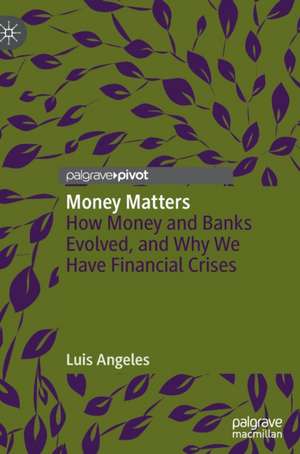Money Matters: How Money and Banks Evolved, and Why We Have Financial Crises
Autor Luis Angelesen Limba Engleză Hardback – 29 mar 2022
Preț: 358.22 lei
Nou
Puncte Express: 537
Preț estimativ în valută:
68.55€ • 71.31$ • 56.60£
68.55€ • 71.31$ • 56.60£
Carte disponibilă
Livrare economică 24 martie-07 aprilie
Livrare express 07-13 martie pentru 30.57 lei
Preluare comenzi: 021 569.72.76
Specificații
ISBN-13: 9783030955151
ISBN-10: 303095515X
Pagini: 147
Ilustrații: XIV, 147 p. 16 illus., 9 illus. in color.
Dimensiuni: 148 x 210 x 17 mm
Greutate: 0.35 kg
Ediția:1st ed. 2022
Editura: Springer International Publishing
Colecția Palgrave Macmillan
Locul publicării:Cham, Switzerland
ISBN-10: 303095515X
Pagini: 147
Ilustrații: XIV, 147 p. 16 illus., 9 illus. in color.
Dimensiuni: 148 x 210 x 17 mm
Greutate: 0.35 kg
Ediția:1st ed. 2022
Editura: Springer International Publishing
Colecția Palgrave Macmillan
Locul publicării:Cham, Switzerland
Cuprins
Introduction.- 1 What is money?.- A History of Money and Banking.- 2 Money from the very beginning.- 3 Banks enter the scene.- 4 The dawn of modern banking.- 5 The creation of a paper currency.- 6 Modern banking comes of age.- 7 The role of banks in a modern economy.- II An Analysis of Financial Crises.- 8 The role of money and the logic of recessions.- 9 Describing financial crises.- 10 The mechanics of financial crises - part one.- 11 The mechanics of financial crises - part two.- 12 Fighting off financial crises.- 13 Preventing financial crises.- Further Reading.- References.
Notă biografică
Luis Angeles is Professor of Economics at the Adam Smith Business School of the University of Glasgow, United Kingdom. He has published work in economic history, economic development, and banking and financial topics. His work has appeared in academic journals such as the Economic History Review, Explorations in Economic History, the Journal of Development Economics, the European Economic Review, Economica, Kyklos, and more.
Textul de pe ultima copertă
This book explores the nature of money and banking throughout their history, and applies this to the study of financial crises. The first part of the book covers the evolution of monetary arrangements, money creation and the business of banking since their earliest manifestations to the present day, showing how changes in the business of banking led to a transformation in the money we use. The second part of the book applies the understanding acquired during the first part to the study of financial crises, showing that money is taken out of circulation when bank loans are paid back. This key insight is at the core of the mechanism that explains financial crises, since an economy that sees its money supply diminish is also an economy that cannot generate enough demand for its own goods and services. Financial crises result when bank lending slows down or comes to a halt – while outstanding bank loans are still due for repayment. The mechanism is discussed in detail, and the crucial role of banks highlighted. Adequate policy measures to prevent crises, or to mitigate their effects, are then put forward in light of this mechanism. The book will be of interest to researchers and students of economic and financial history, as well as those working in finance, banking and economics more widely.
Luis Angeles is Professor of Economics at the Adam Smith Business School of the University of Glasgow, United Kingdom. He has published work in economic history, economic development, and banking and financial topics. His work has appeared in academic journals such as the Economic History Review, Explorations in Economic History, the Journal of Development Economics, the European Economic Review, Economica, Kyklos, and more.
Luis Angeles is Professor of Economics at the Adam Smith Business School of the University of Glasgow, United Kingdom. He has published work in economic history, economic development, and banking and financial topics. His work has appeared in academic journals such as the Economic History Review, Explorations in Economic History, the Journal of Development Economics, the European Economic Review, Economica, Kyklos, and more.
Caracteristici
Describes the evolution of money and banking Offers a view on how to understand financial crises Discusses how fiscal policies combat the effects of financial crises
